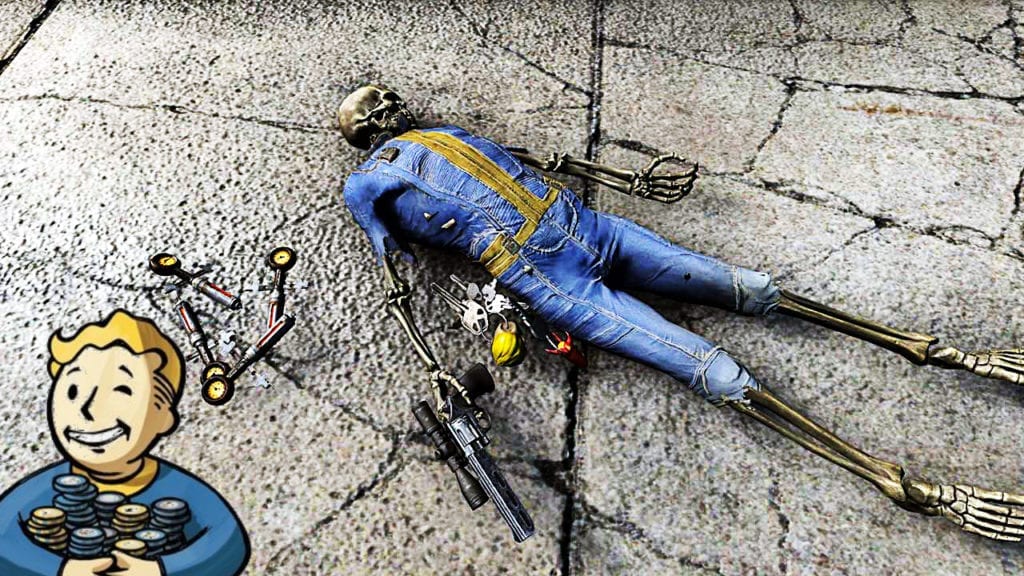Fallout 76, the first online incarnation of the popular franchise, hasn’t felt the love. Fans of the franchise are criticizing everything from bugs (yes, I know, in a Bethesda title) to the empty gameplay. The graphics — seemingly just a rehaul of Fallout 4 — are also in question. The game’s lack of NPCs and weird PvP system are under fire as well. The game wasn’t inexpensive, either, as far as online games go. It appears that the (overwhelmingly negative) hits just keep on coming, with fear of loot boxes on the horizon.

What Fallout 76’s lunchboxes are
Revealed in a recent changelog on Reddit, the latest patch has some troublesome news for players. The patch revealed the arrival of “lunchboxes” — unlockable in-game containers with buff items. While not officially live in-game yet, these lunchbox files in question reveal some pretty concrete info about the nature of these items. The “ATX” tag on the files themselves indicates that they’re an Atom Shop purchase. The Atom Shop is Fallout 76‘s online store. You know, the one where players spend their hard-earned money for digital goodies. The buffs in question will confer everything from hunger/thirst buffs to major game changers such as XP boosting and damage reduction.

More fishy Fallout foibles
Despite Bethesda previously assuring players that only vanity items would be available via microtransactions, filenames don’t lie. Their effects certainly do not, either. XP gain is a major metric for any progression-based game, and being able to purchase more of it would make Fallout 76 pay-to-win. Further adding to the loot box dilemma is Bethesda’s recent changes to gameplay. With event XP and respawn timers being nerfed, progression will be considerably slower. Fallout 76 is not brimming with quests like its offline predecessors. Many players are concerned that these changes were made to pave the way for a very troublesome trend in gaming. If 76 becomes a considerably tedious grind for players, it’s a greater incentive to skip the grind — and buy loot boxes.

The problem with loot boxes in gaming
Microtransactions in video games have become all but a staple amongst online games. They have even migrated to offline single-player titles such as Shadow of Mordor. The degree of dependency a player must have on loot boxes varies from title to title. Some are restricted to cosmetic purchases, making personal customization the area a player must spend money on. Many other titles, however, have become outright pay-to-win. Some games require spending real-life money to have an advantage over other players or to even finish the game at all. This trend isn’t always restricted to free-to-play games, either. Many titles now ask for an upfront purchase and then offer microtransactions on top of that.

Gameplay may suffer
An often-overlooked aspect of loot boxes and pay-to-win is its effect on gameplay. After all, in order to maximize profits, many gaming companies have been accused of altering their gameplay to favor loot boxes. A popular critique has been the end-game in Shadow of Mordor, where the game becomes increasingly reliant on mindless grinding and chance in order to fully complete it. When a game title has an upfront purchase, the incentive is to make it as fun as possible. It gets a great rating, and more people will purchase it due to good reviews and word of mouth. However, when a game is reliant on in-store purchases as a primary source of revenue, the objective becomes maximizing those purchases. What better way to do that then custom-tailor the game to urge players to spend their money to move forward?
Fallout 76 is already a game burdened with many criticisms. Some players feel that the addition of loot boxes — and the slowing down of progression — may be the straw that breaks the irradiated camel’s back. Do you think Fallout 76‘s lunchboxes will affect gameplay? Let us know!















Published: Dec 18, 2018 09:24 am